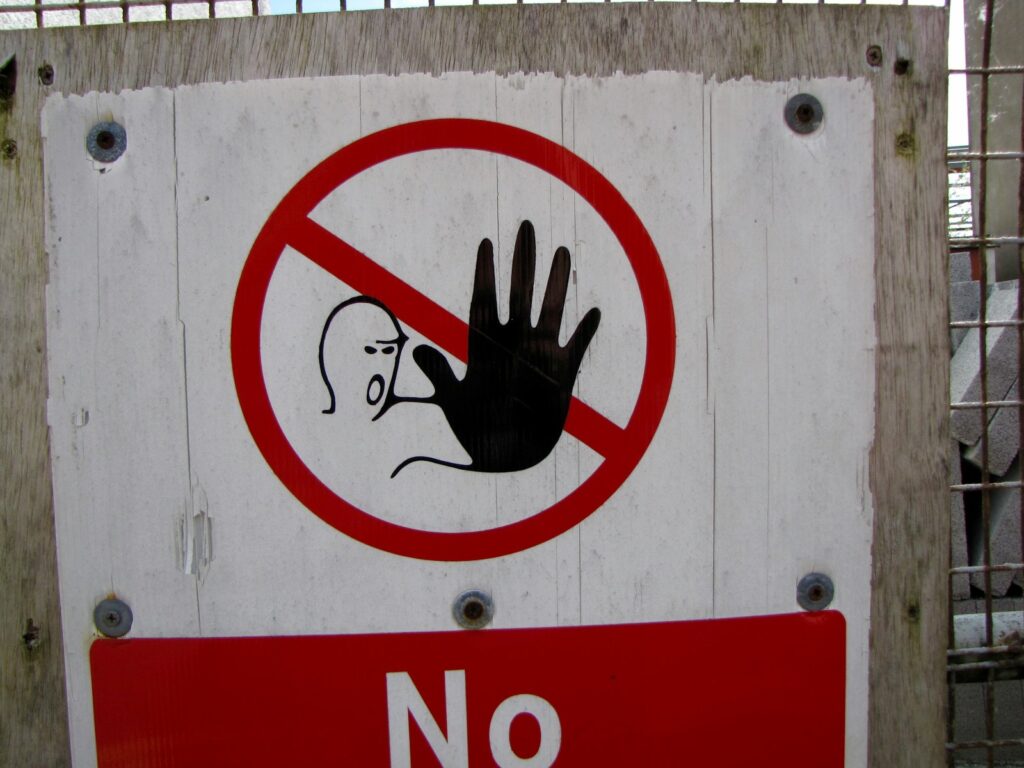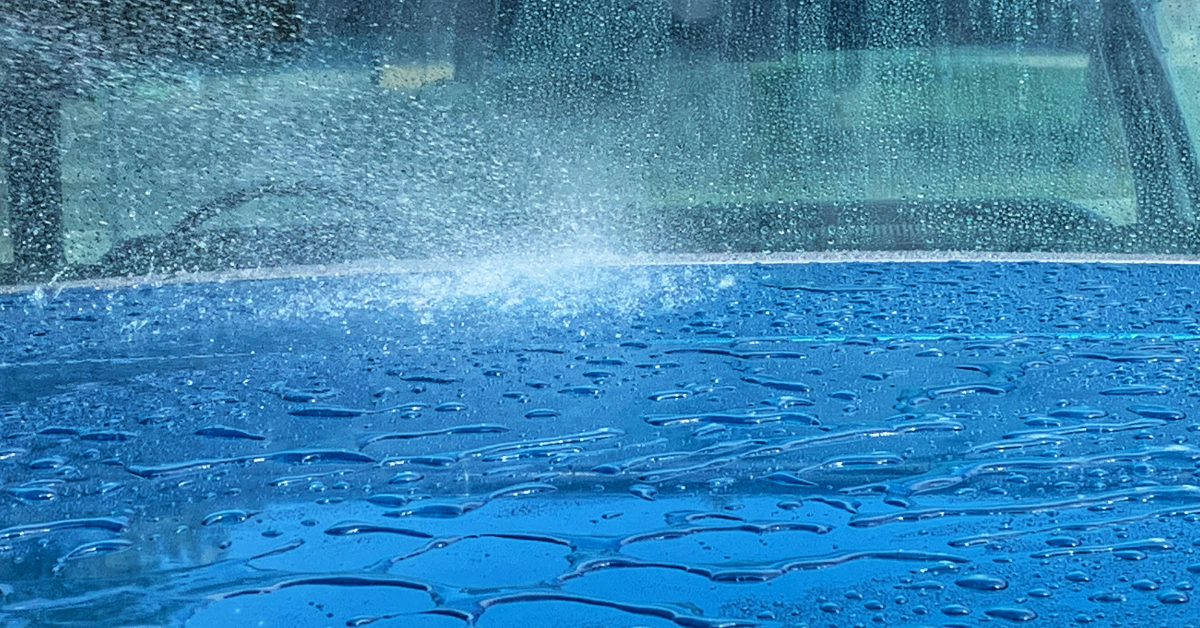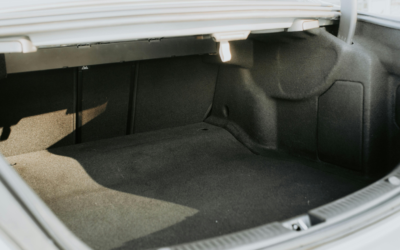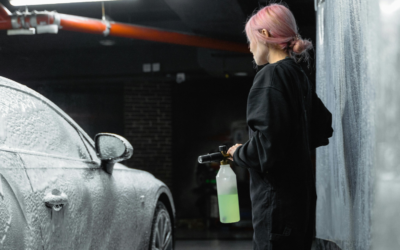We’ve all been there. Your car is covered in a layer of dust and grime, you’re out of proper car wash soap, and a thought pops into your head: “Why not just grab the Dawn from the kitchen?” It seems like a quick and easy solution. After all, dish soap is great at cutting through grease on your plates, so can you use dish soap to wash your car?
The temptation to use dish soap is understandable. It’s convenient, it’s cheap, and for many, it’s just a habit. But as a family-owned car wash here in Germantown, we can tell you from years of experience that dish soap is one of the worst things you can use on your car’s paint. It might seem harmless, but that quick wash could be setting you up for costly damage down the road.
Let’s break down why reaching for that bottle of dish soap is a bad idea and explore what you should be using instead to protect your investment and keep it shining for years to come.

Photo by Jim Petkiewicz on Unsplash
Can You Use Dish Soap to Wash Your Car?
The short answer is: you can, but you absolutely shouldn’t. While dish soap is a powerful cleaner that will certainly remove dirt, pollen, and road grime from your vehicle, it’s too powerful for your car’s delicate finish. Dish soaps are formulated to be aggressive degreasers. Their job is to strip away every trace of oil and caked-on food from your pots and pans.
When you apply that same formula to your car, it doesn’t just remove the dirt—it strips away the essential protective layers your car needs. At Love My Car Car Wash, we’ve seen firsthand what happens when dish soap becomes a regular wash method. The results aren’t pretty: dull finishes, premature fading, and a complete loss of wax protection that leaves the paint vulnerable to the elements.
Your car’s paint isn’t like a ceramic plate. It’s a complex, multi-layered system designed to withstand harsh environmental conditions while maintaining its color and gloss. Using a product designed for baked-on lasagna is simply the wrong tool for the job.
What Dish Soap Really Does to Your Car’s Finish
To understand the damage, it helps to know what dish soap is actually doing to your car’s exterior. It’s not just cleaning with car soap; it’s aggressively stripping. Here’s a scientific breakdown of the harm it causes.
Strips Away Wax and Sealants
The most immediate effect of using dish soap is that it will remove any wax or sealant from your car’s paint. Your car’s protective coatings are your vehicle’s first line of defense. They create a barrier that shields the clear coat from UV rays, acid rain, bird droppings, road salt, and other contaminants. Dish soap dissolves this protective layer in a single wash, leaving your paint exposed and vulnerable.
Dulls the Clear Coat
Your car’s clear coat is the transparent top layer of paint that gives it that glossy shine and protects the colored base coat underneath. Dish soap is highly alkaline and abrasive, which slowly eats away at this crucial layer. Over time, repeated use will cause the clear coat to weaken, oxidize, and turn dull. This is why cars washed with dish soap often lose their luster and appear faded.
Makes Your Car More Vulnerable to Contaminants
Once the wax and clear coat are compromised, your car’s paint is a sitting duck. Contaminants like pollen, tree sap, bird droppings, and road grime will stick directly to the paint surface. Without a protective layer, these substances can etch into the paint, causing permanent stains and damage that are difficult and expensive to repair.
Causes Swirl Marks and Micro-Scratches
Car wash soaps are specifically formulated with lubricants that allow your wash mitt to glide smoothly across the surface. This lubrication is critical for lifting dirt particles away from the paint without scratching it. Dish soap contains no such lubricants. When you wash with it, you are essentially dragging dirt, dust, and grit across your paint with increased friction. This is a perfect recipe for creating swirl marks and micro-scratches that are especially visible in direct sunlight.
So yes, your car might look clean for a moment right after you rinse the suds off—but that shine won’t last. You’ll be trading a short-term sparkle for long-term, cumulative damage.
What About Laundry Detergent or Other Household Cleaners?
If dish soap is a bad idea, what about other common household products like laundry detergent or all-purpose cleaners? Unfortunately, these are just as bad, if not worse. Laundry detergents contain even harsher degreasers and chemicals designed to break down tough stains on fabric, not to gently clean automotive paint.
Using these products on your car can lead to a host of problems:
- Dried-Out Plastic and Rubber: The chemicals in these cleaners can dry out and fade your car’s plastic trim, rubber seals, and vinyl surfaces, causing them to become brittle and crack over time.
- Stained Upholstery: If these cleaners accidentally get on your car’s interior, they can leave behind residue or even permanently stain the upholstery.
- Residue Buildup: Household soaps aren’t designed to be rinsed off large, non-porous surfaces like a car. They often leave behind a film that dulls the finish and attracts more dirt.
Your car’s paint, trim, and interior materials are all engineered to be cared for with specific, automotive-grade cleaners. Sticking to products designed for your car is the only way to ensure its longevity.
What You Should Use Instead: Safe Alternatives That Protect Your Car
Now for the good news: keeping your car clean without damaging it is easy when you use the right products. Here are the essentials for a safe and effective at-home car wash:
- pH-Balanced Car Wash Soap: Always use a dedicated car shampoo. These soaps are pH-balanced to be gentle on your car’s finish while still being effective at lifting dirt and grime. They also contain lubricants to prevent scratching.
- The Two-Bucket Method: This simple technique dramatically reduces the risk of swirl marks. Use one bucket for your soapy water and a second one filled with clean water for rinsing your wash mitt. This prevents you from transferring dirt from the car back into your clean soap mixture.
- Microfiber Wash Mitts and Towels: Microfiber is soft, absorbent, and designed to trap dirt particles away from the paint surface. Avoid using old rags, bath towels, or sponges, which can be too abrasive.
- Dedicated Wheel Cleaner: Your wheels are exposed to brake dust, which is highly corrosive. Use a separate wheel cleaner and brushes to tackle this grime without spreading it to your car’s paint.
- Protective Wax or Ceramic Coating: After washing, always apply a layer of protection. A quality car wax or a more durable ceramic coating will lock in that shine and shield your car’s finish from future damage.
At Love My Car, every wash—from our affordable Bronze package to our premium Diamond wash—uses professional-grade soaps and finishes that clean safely and restore your car’s protection.
Why Professional Car Care Pays Off
While washing your car at home can be rewarding, there are times when letting the pros handle it is the best choice. Professional car washes and detailers have access to equipment and products that go beyond what most people have in their garages.
Our team in Germantown uses the same advanced products that professional detailers trust, giving you that showroom look without the showroom price. Our multi-tier packages, like the Gold and Diamond washes, include services like triple foam, rain repellent, and even ceramic coatings to provide layers of protection. For those looking for long-term care, our detailing services offer hand-applied wax and ceramic coatings that can protect your vehicle for months or even years.
Seasonal Car Care in Maryland: Why Proper Soap Matters
Here in Germantown, our cars face a different challenge with every season. Using the wrong soap, like dish soap, makes your paint far more vulnerable to these specific threats.
- Winter: Maryland winters mean road salt. This corrosive material can quickly eat into your car’s clear coat if not washed off properly. A professional wash with an undercarriage cleaner is essential.
- Spring: As the flowers bloom, so does the pollen. Pollen is acidic and can stain your paint if left to sit. Spring showers also bring tree sap, which can be tough to remove without the right products.
- Summer: The summer sun brings intense UV rays that can fade your car’s paint. Bird droppings, another summer menace, are highly acidic and can etch the clear coat in a matter of hours. A good wax or sealant provides critical UV protection.
- Fall: Wet leaves can stick to your car and leave behind tannins that stain the paint. The constant dampness also means more mud and grime on the roads.
Each season requires a proactive approach to car care. Sticking to a proper washing and waxing routine ensures your car’s finish is protected all year long.

Keep the Dish Soap in the Kitchen
The takeaway is simple: your car is a significant investment, and protecting its finish is key to maintaining its value and appearance. While dish soap might get your car clean in a pinch, it does so at the cost of stripping away its protective layers, dulling the finish, and opening the door to long-term damage.
At Love My Car Car Wash, we’re not just washing cars—we’re helping our Germantown neighbors protect their investments and feel good about what they drive. Our family-owned business takes pride in delivering a top-quality clean every time.
Show your car some love and stop by Love My Car today! Or, for the ultimate convenience, join our Unlimited Wash Club and enjoy a spotless ride year-round.
Frequently Asked Questions
Q: Can I use dish soap to wash my car just once in a while?
A: We strongly advise against it. Even a single wash with dish soap can be enough to strip away the protective wax layer on your car, leaving the paint vulnerable to UV rays, dirt, and other environmental contaminants. It’s always best to use products specifically made for cars.
Q: What is the best soap to wash a car?
A: The best soap is a dedicated, pH-balanced car shampoo. These products are formulated to effectively remove dirt and grime without stripping wax or damaging your car’s delicate clear coat. They also contain special lubricants to help prevent swirl marks and scratches during the washing process.
Q: How often should I wash my car?
A: For most drivers in the Germantown area, washing your car every one to two weeks is ideal. This helps prevent the buildup of corrosive materials like road salt, bird droppings, and pollen. If you find that schedule hard to keep, consider joining our Unlimited Wash Club—it’s a cost-effective way to keep your car clean without ever having to worry about it!




